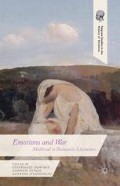Abstract
The Thebaid of Statius (d. 94 CE) provides the great model of militarist catastrophe for the European Middle Ages and beyond. The Olympian gods, humans (often excellent, justice-loving humans), and the Furies each participate in a relentless dialectic of inciting each other to furious, exhausting, and destructive combat. Emotion dominates the poem’s action and cosmos, both enormous emotional energy, and total emotional exhaustion. By contrast, the medieval tradition, as represented by Lydgate’s Siege of Thebes (1421–22), almost wholly absents the gods. Fury drives the war in an over-determined historical process, to be sure, but that fury has human origins, and could have been checked in deliberative fora. In this tradition, bad committee practice, rather than the mythic violence written into the cosmos, impels almost all players to disastrous ends.
Access this chapter
Tax calculation will be finalised at checkout
Purchases are for personal use only
Preview
Unable to display preview. Download preview PDF.
Notes
I freely use the word ‘emotion’ in this essay, recognizing all the while that my authors, both classical and medieval, would have used the term ‘passions’. For the history of the term emotion, and the larger history of the passions, see Thomas Dixon, From Passions to Emotions: The Creation of a Secular Psychological Category (Cambridge: Cambridge University Press, 2003). I warmly acknowledge the inspiration and pleasures of a Latin literature reading group among friends in Cambridge MA, with whom I first read Statius seriously.
My use of the word ‘twilight’ is designed to resonate with the brilliant point of C. S. Lewis in The Allegory of Love (Oxford: The Clarendon Press, 1936): ‘But the twilight of the gods is the mid-morning of the personifications,’ 52. I am profoundly indebted to Lewis’ exceptionally pregnant pages (48–56) on the Thebaid.
For this dialectic, see D. C. Feeney, The Gods in Epic (Oxford: Clarendon Press, 1991), 345.
For this argument, see also Lewis, Allegory of Love, 48–56; Feeney, The Gods in Epic, 338–64; and Philip Hardie, The Epic Successors of Virgil (Cambridge: Cambridge University Press, 1993), 42–5.
For examples of human virtue and altruism in the Thebaid, see Winthrop Wetherbee, The Ancient Flame: Dante and the Poets (Notre Dame, IN: University of Notre Dame Press, 2008). I am deeply indebted to the Statius chapter in this book, and thank Pete Wetherbee for sending this material to me.
For the Statian tradition in Chaucer, see Winthrop Wetherbee, Chaucer and the Poets: An Essay on ‘Troilus and Criseyde’ (Ithaca, NY and London, 1984), 111–44, and Lee Patterson, Chaucer and the Subject of History (London: Routledge, 1991), 126–36.
For Chaucer, see, for example, Troilus and Criseyde, 2.99–108, in which Chaucer refers adroitly to both the Latin and the Old French version in compact space; for Lydgate, see Lydgate’s Troy Book, ed. Henry Bergen, 4 Parts, EETS, es 97, 103, 106, and 126 (Kegan Paul, Trench and Trübner, 1906, 1908, 1910, and 1935), Prologue 226–44, which refers explicitly to Statius (‘In grete Stace ye may reden al’ (Prol. 240), and which refers to episodes in Statius not found in the later medieval redactions. All further references to the Troy Book will be made by book and line number in the body of the text. See Andrew Lynch, ‘Love in Wartime: Troilus and Criseyde as Trojan History’, in A Concise Companion to Chaucer, ed. Corinne Saunders (Oxford: Blackwell, 2005), 113–33.
For the anti-idolatry passage in Troy Book, translated from Lydgate’s source, see Troy Book, Book 2.5391–924. For romans d’antiquités in English, see Barbara Nolan, Chaucer and the Tradition of the Roman Antique, Cambridge Studies in Medieval Literature, 15 (Cambridge: Cambridge University Press, 1992).
The following seven paragraphs are drawn from James Simpson, ‘John Lydgate,’ in The Cambridge Companion to Medieval Literature, ed. Larry Scanlon (Cambridge: Cambridge University Press, 2009), 205–16.
For Lydgate’s role in the Lancastrian court, see Paul Strohm, ‘Hoccleve, Lydgate and the Lancastrian Court’, in The Cambridge History of Medieval English Literature, ed. David Wallace (Cambridge: Cambridge University Press, 1999), 640–61.
Editor information
Editors and Affiliations
Copyright information
© 2015 James Simpson
About this chapter
Cite this chapter
Simpson, J. (2015). Human Prudence versus the Emotion of the Cosmos: War, Deliberation and Destruction in the Late Medieval Statian Tradition. In: Downes, S., Lynch, A., O’Loughlin, K. (eds) Emotions and War. Palgrave Studies in the History of Emotions. Palgrave Macmillan, London. https://doi.org/10.1057/9781137374073_6
Download citation
DOI: https://doi.org/10.1057/9781137374073_6
Publisher Name: Palgrave Macmillan, London
Print ISBN: 978-1-349-67705-4
Online ISBN: 978-1-137-37407-3
eBook Packages: Palgrave History CollectionHistory (R0)

